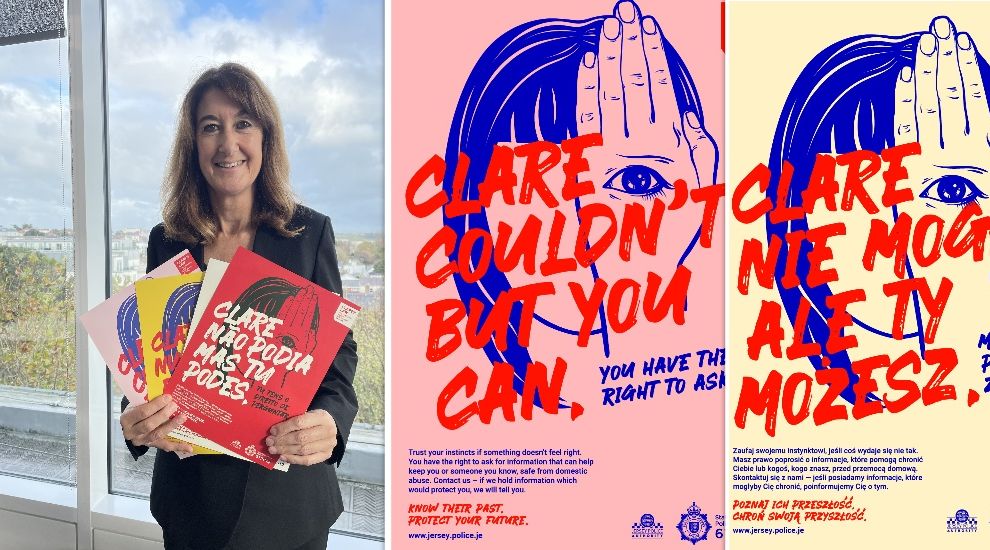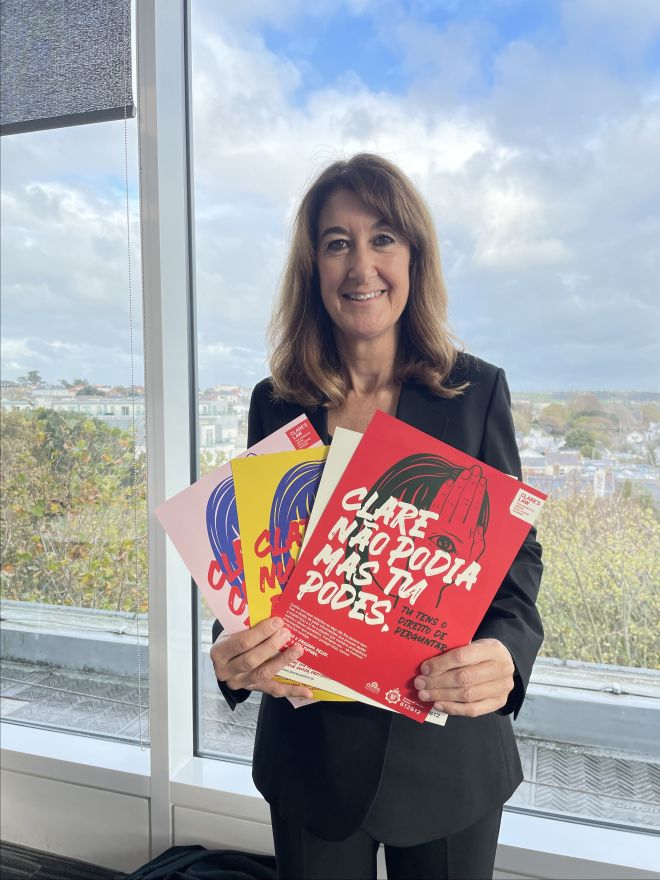


Police this week launched a campaign to get more islanders to use Clare's Law – a "lifesaver" provision that allows anyone to find out if their partner has an abusive past.
Today, Express took a look at how Clare's Law works...
Clare's Law was introduced across Jersey, England and Wales in 2014.
Formally called the Domestic Violence Disclosure Scheme, 'Clare's Law' refers to Clare Wood – a woman from Yorkshire who was murdered by her ex-boyfriend in 2009.

Pictured: Detective Superintendent Alison Fossey with some of the new 'Clare's Law' posters.
Serial perpetrators "often move from one victim to another", Detective Superintendent Alison Fossey explained – and the Clare's Law campaign aims to warn partners of this before it is too late.
"I'd love to see a lot of applications, anything that's going to prevent domestic abuse and reduce the misery that some people have to go through in their lives," she said.
Clare's Law can be used by anyone, in same- and opposite-sex relationships, and regardless of race, Det Supt Fossey explained.
The law's 'right to ask' provision allows anyone to ask for information about a partner they are concerned about, or to make a request on behalf of someone else.
Meanwhile, the 'right to know' clause means the police will get in touch with someone who they learn is in a relationship with a serial abuser.
The initial request involves either an online form, or speaking to police on 612612 or at the police station.
Details will be gathered about both you and the person you are asking about, and police will also make initial checks and carry out a risk assessment.
Islanders can download the form here or from jersey.police.je and email it to hello@jersey.police.je.
You might then be called for a face-to-face meeting with the police, used mostly to confirm your identity and check what your concerns are.
This is followed by a research period when police will look at what information they can share with you, if any.
If they have found any information, officers will then meet you again for a disclosure of past abuse or anything else they feel you should know.
This information, according to police, will be "lawful, proportionate, and necessary".
This comes along with a "wraparound" package of support – often involving other charities such as Jersey Domestic Abuse Support – to help people take the next steps.
This can involve making their homes safe, putting in place safety words, or supporting them so they can leave the relationship safely.
The number of people who ask for information annually in Jersey is "in the single digits", according to Det Supt Fossey.
Last year, a further 25 people were contacted under the 'right to know' provision.
"At the moment, it's minimal – really minimal," she admitted, attributing the low engagement numbers to a lack of publicity about the scheme.
The Clare's Law campaign aims to increase these numbers – and Det Supt Fossey said she wanted to see "a big increase".
One of the islanders who was contacted under the 'right to know' provision is Suzie Mahe.

Pictured: Suzie waived her right to anonymity to encourage other women to speak up, and start a push for legislative change to provide more protection for victims.
Police got in touch with her in 2022, when she was dating ex-Shinzo boss Gavin Roberts.
The 45-year-old restauranteur was later convicted of raping, sexually assaulting, and assaulting Suzie in a nine-day Royal Court trial. He was sentenced to 15 years' imprisonment last week.
Speaking to Express, Suzie described Clare's Law as "a lifesaver".
"It's a safety net for yourself," she explained.
"You would much rather be upset for a week because you've met someone and thought they were the right person but you hear this information, than be three months down the line and the person is showing concerning behaviours."
Clare's Law posters come in four different languages, and more materials have been given to professionals to help them navigate the law.
Under Clare’s Law, you have the right to:
Make an application to the police requesting information about your current or ex-partner, because you are worried they may have been abusive in the past and believe they may pose a risk to you in future.
Request information from the police about the current or ex-partner of a close friend, neighbour or family member, because you are concerned that they might be at risk of domestic abuse in future.
Islanders affected by any of the issues raised in this report can contact any of the following:
SARC at Dewberry House provides expert independent and confidential support to victims of sexual abuse. Tel: 01534 888222.
Jersey Action Against Rape (JAAR) provide and maintain a supporting framework for survivors and their families. Confidential helpline: 01534 482800.
Freeda (formerly Jersey Women’s Refuge) offer help and support for victims of domestic abuse. Tel: 0800 7356836.
Jersey Domestic Abuse Support (JDAS) is an independent service developed to protect and support victims of domestic and sexual abuse. Tel: 01534 880505.
Victim Support offer free and confidential advice to victims of crime. Tel: 01534 440496.
Victims First Jersey is a free and independent service offering confidential support to victims and witnesses of crime. Tel: 0800 7351612.
Samaritans offer a confidential and non-judgemental listening ear to people who need to talk. Tel: 116 123 free from any phone or 0330 094 5717 (local call charges apply).
Comments
Comments on this story express the views of the commentator only, not Bailiwick Publishing. We are unable to guarantee the accuracy of any of those comments.